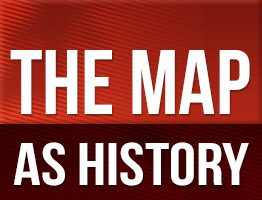This map is part of a series of 19 animated maps showing .
▶ View series: Europe's colonial expansion, 1820-1939
SubscribeConquest of Africa: a period of incubation
This map is part of a series of 19 animated maps showing the history of Europe's colonial expansion, 1820-1939.
At the beginning of the 19th century, there were still few Europeans in Africa and most of these were located in Portuguese, British and French trading posts dotted along the coast.
Over a period of three centuries, these ports had been founded mainly to develop commerce along the coast, provide harbours along the ocean routes and serve the slave trade, which was resisting campaigns by abolitionists in certain countries.
In the early decades of the 19th century, European explorers began travelling inland from the coastal ports and up the rivers. In the early stages, these excursions did not threaten the many African political entities.
To the North, the Ottoman Empire’s African possessions were facing rebellion.
South of the Sahara, the borders between African states were generally very vague and a large diversity of ethnic origins and languages lived side by side:
-to the West of the Sahel, the revival of Islam led to wars between rivals and gave birth to powerful Muslim states, such as the Toucouleur Empire and the Caliphate of Sokoto
-the kingdoms along the Guinean coast were in close contact with the European ports, although this proximity sometimes led to conflicts.
-Centuries-old kingdoms, such as Buganda, Rwanda and Burundi, dominated the Great Lakes region.
-the Christian empire of Ethiopia and the Island of Madagascar remained apart, due to the specificity of their origins and internal organization.
-in Southern Africa, the aggressive and warlike Zulu Nation threatened the fragile balance among Bantu peoples.
In the 1830s, the campaigns against slavery provided a pretext for new European settlements, stimulated first by trade in ivory and gold, and later in peanuts and palm oil.
Between 1836 and 1838, the Boers in the Cape Colony moved north-east to create two European republics;
Great Britain reinforced its settlement in the Gulf of Guinea and extended its colony in the Cape;
Portugal began to consolidate its presence and to link its colonies in Mozambique and Angola;
France established its presence in the Gulf of Guinea and pursued its conquest of Algerian, Senegalese and Equatorial African hinterlands.
The rivalry in the Lower Congo region between the French explorer Brazza and the Anglo-American journalist working for Leopold II of Belgium, Henry Morton Stanley, reflected the turn taken by European powers in Africa: competition became increasingly ambitious, and aggressive.
But it was their interest for the territories of the Ottoman Empire which spurred the division of Africa: establishment by France of a Tunisian protectorate in 1881 and the British military occupation of Egypt the following year marked the beginning of an era of competition between the European powers for control of African territories.
